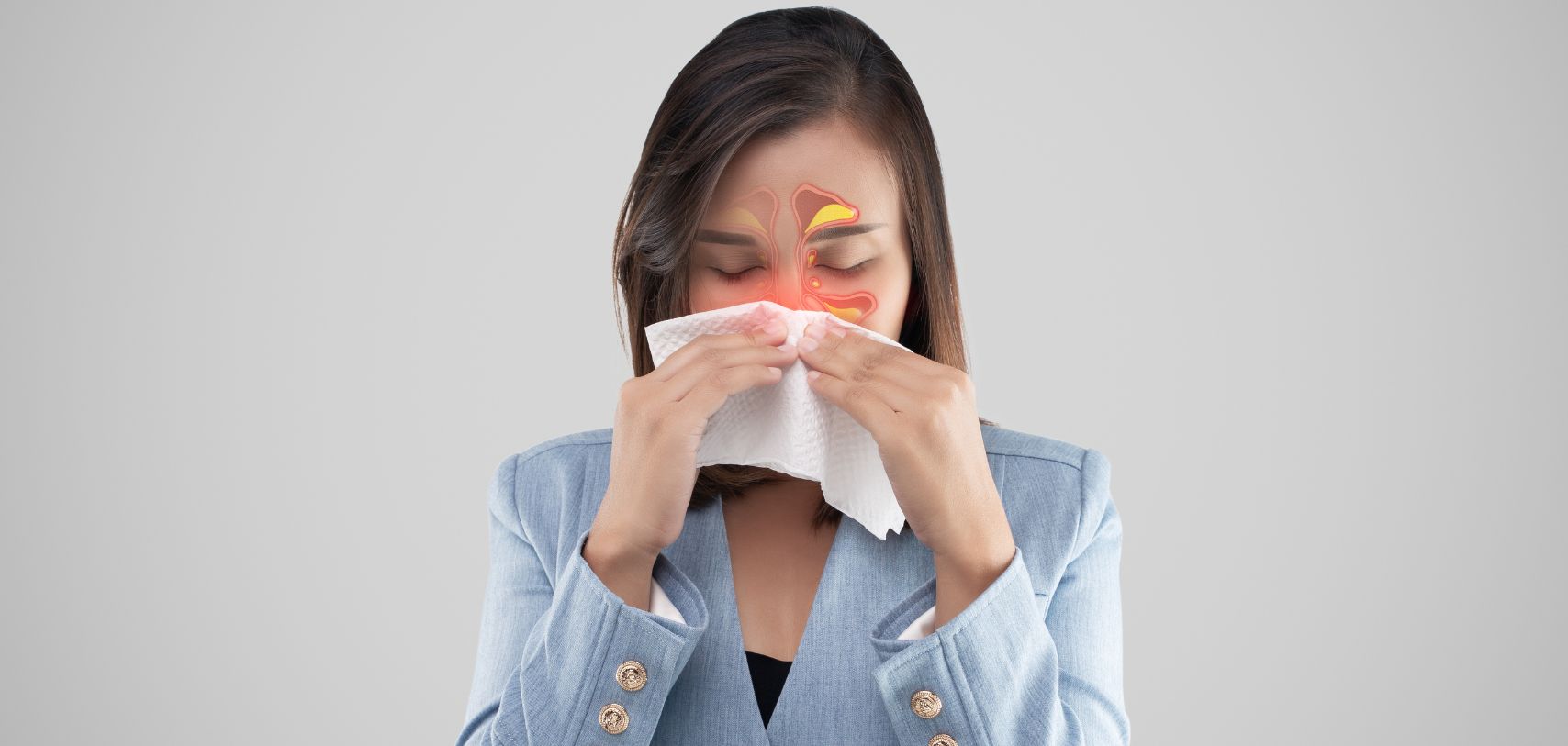
Hedrinia Shylla, 22, from Meghalaya, often experiences episodes of nasal congestion, facial pain, and headaches. “These symptoms have been bothering me for a few years now, and my doctor has confirmed that I have sinusitis,” she says. She also has a history of allergies, particularly to dust and pollen. “My symptoms worsen and peak, especially during the pollen season, but taking medicines and doing regular steam inhalation helps,” she adds.
Dr Susmitha B, a consultant ENT surgeon at Aster Prime Hospital in Hyderabad, explains that sinusitis (also known as rhinosinusitis) is characterised by inflammation and infection of the mucosal lining of the nose and sinuses. This condition can result in facial pain, a runny or blocked nose, and fever. Sinusitis is typically caused by an inflammatory response or infection triggered by a virus, bacterium, or fungus.
“Our skull has air-filled spaces located near the forehead, nasal bones, cheeks, and eyes. These healthy sinuses are typically free of any bacteria or germs, causing no harm,” says Dr Susmitha. However, when the sinus opening becomes blocked or filled with mucus, bacteria and other germs settle and grow in these spaces.
Types and causes
According to Dr Susmitha and Dr Sangeeta Varty, consultant ENT, PD Hinduja National Hospital and Medical Research Centre, Mumbai, sinusitis can be of two types:
Acute sinusitis
Acute sinusitis, also known as acute rhinosinusitis, is a temporary inflammation of the nasal passages and sinuses. It is generally caused by an allergy or cold and may resolve on its own. It usually lasts for less than four weeks.
Chronic sinusitis
Chronic sinusitis or chronic rhinosinusitis can last up to eight to twelve weeks and is mainly caused by an infection. It can also be characterised by inflammation of the nasal passages and sinuses that lasts for more than 12 weeks. It can be classified into two main types:
- Chronic rhinosinusitis with nasal polyps
- Chronic rhinosinusitis without nasal polyps
Nasal polyps are abnormal growths that develop in the lining of the nasal passages and sinuses. They are usually noncancerous and appear as swollen or protruding masses.
“In terms of severity, the presence or absence of nasal polyps does not necessarily indicate a more severe or less severe form of chronic sinusitis,” says Dr Varty. The classification into chronic rhinosinusitis with or without nasal polyps primarily helps in guiding treatment approaches.
You can also read about the difference between acute and chronic sinusitis.
Cause
The causes of sinusitis can differ from person to person. The main causes that can affect one’s sinus according to Dr Varty are:
- Viral infections: Most episodes of acute sinusitis are brought on by viral infections like the flu or the common cold. The sinus passages may become inflamed and blocked because of these viruses.
- Bacterial infections: While less common, bacterial infections can also cause sinusitis, especially in cases where symptoms persist for more than 10 days or worsen after initial improvement. Bacteria such as Streptococcus pneumoniae, Haemophilus influenzae, and Moraxella catarrhalis are commonly associated with bacterial sinusitis.
- Allergies: Allergic rhinitis, also known as hay fever, can contribute to the development of sinusitis. When a person with allergies is exposed to allergens such as pollen, dust mites, or pet dander, it can trigger an allergic reaction that leads to nasal inflammation and sinus congestion.
- Structural abnormalities: Certain structural abnormalities within the nasal passages and sinuses can obstruct proper drainage and airflow, making individuals more prone to sinusitis. Deviated septum (a crooked nasal septum), nasal polyps, or nasal tumours can contribute to chronic sinusitis.
- Nasal irritants: Exposure to irritants including air pollution, chemical fumes, and cigarette smoke can inflame the sinuses and nasal passages, which can result in sinusitis.
- Immune system disorders: The risk of sinusitis could be higher for individuals with autoimmune diseases or other conditions that weaken the immune system.
In Shylla’s case, the recurrent episodes of sinusitis triggered mostly by pollen and dust indicated allergic rhinitis.
Symptoms of sinusitis
The symptoms of sinusitis can be minor or major depending on the severity of the condition. Dr Varty and Dr Susmitha have further listed out the symptoms:
Minor Symptoms:
- Headache
- Halitosis (bad breath)
- Chronic cough
- Fatigue
- Dental pain or pressure
- Dizziness or light-headedness
- Ear pain or fullness
Major Symptoms:
- Facial pain or pressure, particularly around the cheeks, below the eyes, or in the forehead.
- Facial fullness or congestion.
- Nasal obstruction or blockage.
- Purulent (thick, discoloured) discharge from the nose.
- Postnasal drip (mucus dripping down the back of the throat).
- Decreased sense of smell (hyposmia) or complete loss of smell (anosmia).
- Fever
Prevention
According to Dr Susmitha, there are a few simple ways to reduce the risk of getting a sinus infection.
- Keep rinsing your nose regularly
- Stay away from your known allergy triggers
- Develop good handwashing habits
- Stop/quit smoking
- Do not ignore repeated upper respiratory tract infection
- Seek professional help
Diagnosis and treatment
Chronic and acute rhinosinusitis can often be diagnosed clinically based on symptoms such as nasal blockage, headache, and facial pain.
“An examination using a nasal endoscope can reveal mucosal inflammation and discharge in the nostrils, further supporting the diagnosis. A CT scan may be recommended to provide a detailed image of the sinuses,” says Dr Varty.
Treatment for sinusitis varies depending on the type and severity.
According to Dr Varty, acute sinusitis is self-limiting and can be managed with home remedies. If the condition persists beyond 14 days or is suspected to be bacterial, a culture and sensitivity test may be conducted on the nasal discharge to guide the choice of appropriate antibiotics.
“Severe or chronic cases that do not respond to conservative treatment may require endoscopic sinus surgery to clear obstructions, open blocked sinuses, and promote proper drainage. This surgery aims to improve the overall health of the sinus mucosa,” says Dr Varty.

















